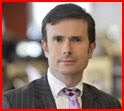Andy Coulson: "I stand by what I've said about those events but when the spokesman needs a spokesman it's time to move on."
Guardian editor-in-chief Alan Rusbridger on Coulson resigning: "This is the result of first class investigative reporting by one
Guardian reporter, Nick Davies, sustained over a very long period of time. From the moment he revealed the secret payout to Gordon Taylor in July 2009 it was obvious that Andy Coulson's position was untenable. But this is not the end of the story by any means. There are many outstanding legal actions, and uncomfortable questions for others, including the police."
Robert Peston on his blog: "Not to over-dramatise, this has all the potential for the newspaper industry to turn into its version of the MPs' expenses scandal."
Richard Ingrams in the Independent on Sunday: "In a world where nothing succeeds like failure, Andy Coulson has no reason to fear for his future. He should take heart from the example of his labour predecessor Alastair Campbell, who ended up resigning but who is now riding high, publishing books and even appearing regularly on the BBC, an institution which during his career at Downing Street he did more to damage than anyone else in our time."
Sky News political editor Adam Boulton: "Two important sectors of our society now feel under a great deal of pressure, beset by plunging fortunes and public esteem: newspapers and politicians. As they go down they are turning in on each other with increasing viciousness - politician against journalist, politician against polititian, journalist against journalist."
Andreas Whittam Smith in the Independent: "But as we have an unwritten constitution, so we have writs that are unrecorded. And if it were spelled out, it would simply state: never offend the Murdochs. Nobody will say this in terms to the Department of Culture that is now handling media competition issues. Nobody has written it down for Scotland Yard's benefit. But this odious rule has become part of our unofficial constitution. That is how bad it is."
Bill Keller, executive editor of the New York Times: "As for our relationship with WikiLeaks, Julian Assange has been heard to boast that he served as a kind of puppet master, recruiting several news organizations, forcing them to work in concert and choreographing their work. This is characteristic braggadocio — or, as my Guardian colleagues would say, bollocks."
Communities and Local Government Select Committee report on the proposed code of practice on local authority publicity: "We found that there is little hard evidence to support the view of the commercial newspaper industry that council publications are, to any significant extent, competing unfairly with independent newspapers at present, though there is concern that such competition may escalate in future."
Leader on cuts to BBC World Service in the Independent: "The World Service helps to nourish democracy and political accountability across the world. Moreover, it produces much high-quality, impartial, and authoritative journalism. It exports British "soft power" and remains an island of resistance to the global proliferation of celebrity news. A relatively small nation such as Britain may struggle to be heard in the globalised age. Weakening one of its strongest international assets is a mistake."
Peter Sissons in the Daily Mail: "If you want to read one of the few copies of the Daily Mail that find their way into the BBC newsroom, they are difficult to track down, and you would be advised not to make too much of a show of reading them. Wrap them in brown paper or a copy of the Guardian, would be my advice."


































